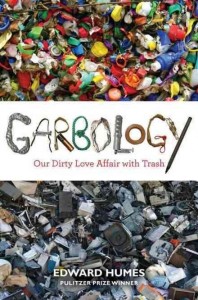Letter to Dad: Garbology
Dear Dad,
I miss you and the rest of the family very much. So far, I’m starting to feel more adjusted to the CSUN campus and my classes.
Hey Dad, remember when I came home over the weekend and you asked, “What’s that book you’re reading? What’s Garbology?” Well Dad, in my English 113A class, I was assigned to read this book, Garbology: Our Dirty Love Affair with Trash by Edward Humes. Despite for the times he was being sarcastic, so far Dad, this book is unbelievable. Have you ever wondered where our trash goes? Or why is that we have to buy items that advertisements portray as a “trend” or a “must have”? Humes’s purpose of writing this book was to give American society a reality check of how much trash we dispose. Believe me, Dad, you would be shocked as much as I was.
To begin with, in Humes’s book, an interesting selection that struck my attention is the truth of how today’s advertisements continue to bribe us to buy the latest items, whether it would be clothing, technology, etc. I mean, aren’t you guilty of that too Dad? Humes utilizes J. Gordon Lippincott, who is known for product and brand designing, as a reference. Humes states, “The more we waste,in his view, the more stuff his clients could sell, the more consumers would buy, and the more prosperous America would become. Failure to waste was the enemy” (Humes). Dad, I could not help but feel that Lippincott and other marketing industries are very selfish. I mean, to think maybe they are aware of America’s “trash problem,” and rather than to somehow find a solution, they want to encourage us to make more of the problem.
Furthermore, I was so interested in this topic Dad, that I began to research more about it. I came upon an interesting video called, “The Story of Stuff,” which is narrated by Annie Leonard. What I loved about this video is that, in some ways, I am able to see Humes’ information that he discusses in the book. Leonard makes a reference to “the golden arrow of consumption” (“The Story of Stuff”), which is the cycle we continue to follow, and 99% of the items we buy will ended up being thrown away within six months. Also, she mentions how advertising and media brainwash us, making us feel left out if we did not get the latest items out being sold.
The similarities between Humes’ and Leonard’s main points was both used sarcasm within their explanation. I know you’re probably thinking asking, “Why are they being sarcastic if it’s a major issue?” Dad, I think the whole point of that was for us, the audience, to realize that the facts being presented and the actions we take are true. The difference between their arguments would be that, in this section of the book, Humes focused on a certain topic and presented a person that played a major role in marketing and the things we buy. For Leonard, she gave an overall explanation of everyone’s actions in general.
I don’t know about you, but I am starting to realize that most of the items we have at home could last a couple of years. We don’t need to buy what advertisements find to be “essential.” What matters the most is that we have a roof above our heads and items that are really essential for everyday use. Hopefully, this information didn’t scare you, but helped you to be more aware of the disposal of our trash. I mean, it’s great to treat yourself once in awhile to buy the latest item, for instance a pair of shoes. If you like them buy them, but that does not mean you have to keep the upgraded version of the shoes.
Well Dad, I hope you found this information useful, and now we can control the way we shop. Please send my hugs and kisses to everyone, I love you all.
Love,
Jenny
Works Cited
Humes, Edward. Garbology: Our Dirty Affair with Trash. New York: Avery, 2012. Print.
Story of Stuff. Annie Leonard, Jonah Sachs. Dir. Louis Fox. Per. Annie Leonard. December 2007. Video.
